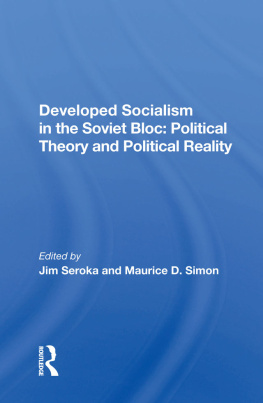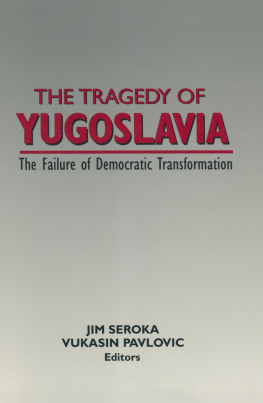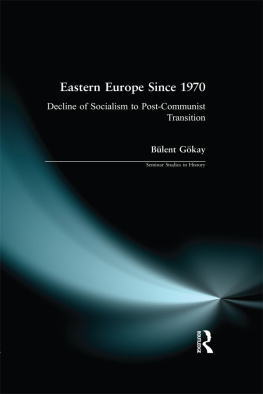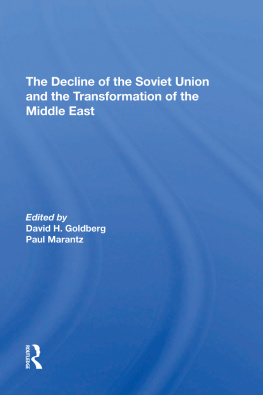Developed Socialism in the Soviet Bloc
Westview Special Studies on the Soviet Union and Eastern Europe
Developed Socialism in the Soviet Bloc: Political Theory and Political Reality edited by Jim Seroka and Maurice D. Simon
This book traces the evolution of Soviet and East European responses to the multifaceted pressures of a rapidly changing world and looks at the implications of ideological developments in the Soviet bloc for economic reforms, general policymaking, and political and social change. The authors discuss the concept of developed socialism and its essential components as seen in communist societies; analyze current policy and likely future policy directions in the Soviet Union, Czechoslovakia, Hungary, Romania, Poland, and Yugoslavia in light of the concept; and assess the impact that ideological trends have had, and are likely to have, on the Soviet Union and Eastern Europe in general.
Jim Seroka is assistant professor of political science at Southern Illinois University specializing in Eastern European political systems. Maurice D. Simon is assistant professor of political science at the University of North Carolina. He is coeditor of Background, to Crisis: Policy and Polities in Gierek's Poland (Westview).
This book is dedicated to John M. Echols III
First published 1982 by Westview Press, Inc.
Published 2018 by Routledge
52 Vanderbilt Avenue, New York, NY 10017
2 Park Square, Milton Park, Abingdon, Oxon OX14 4RN
Routledge is an imprint of the Taylor & Francis Group, an informa business
Copyright 1982 Taylor & Francis
All rights reserved. No part of this book may be reprinted or reproduced or utilised in any form or by any electronic, mechanical, or other means, now known or hereafter invented, including photocopying and recording, or in any information storage or retrieval system, without permission in writing from the publishers.
Notice:
Product or corporate names may be trademarks or registered trademarks, and are used only for identification and explanation without intent to infringe.
Library of Congress Catalog Card Number 82-50727
ISBN 13: 978-0-367-01927-3 (hbk)
Fifteen years have passed since Leonid Brezhnev endorsed the theoretical doctrine of "Developed Socialism." For many observers, this doctrine signified a new commitment to economic and political pragmatism and flexibility in the Soviet Union and socialist Eastern Europe. The grim realities of the martial law declared in Poland on December 13, 1981, present a stark contrast to the optimistic themes of the "Developed Socialism" doctrine. The maintenance of political control through the exercise of military power is a far cry from the internal reforms and changes implied by developed socialism. This collection of essays examines the varied meanings and preliminary applications of developed socialism taking care to distinguish between doctrine and practice.
In DEVELOPED SOCIALISM we explore how the doctrine established an introductory procedural framework for legitimized change and reform of the socialist system throughout the Soviet Union and Eastern Europe. We also examine how differing Soviet and East European interpretations of the doctrine have affected processes and prospects for meaningful internal reform and, in particular, how the specific states have coped with various pressures associated with industrialization and development. Finally, the essays consider why the process of reform implied by the doctrine of developed socialism has been limited in its scope and impact, and thus is unlikely to herald a departure from authoritarian patterns of governance.
DEVELOPED SOCIALISM is divided into two sections. The first part contains a series of essays dealing with specific countries, including contributions by Donald Kelley and Jeffrey Hahn on the Soviet Union, David Paul on Czechoslovakia and Hungary, Daniel Nelson on Romania, Jim Seroka on Yugoslavia, and Maurice Simon on Poland. The essays in this section demonstrate how social pressures for material welfare and political participation have affected the ideological and political systems of specific socialist states. In short, the first section of DEVELOPED SOCIALISM analyzes how this doctrine, while originating from a common source, has generated divergent political discussions and policy impacts in European socialist societies.
Donald Kelley, In his selection on the impact of developed socialism in the Soviet Union, analyzes the standard formulation of the doctrine. He investigates how the doctrine envisions the role of the party and its potential effects upon the operation of the Soviet bureaucracy, the system of management, and the party apparatus. Kelley's description of the new party role as a coordinating unit within a complex, interest-based milieu is of great significance, for it suggests that it may thereby become an effective agency for broad-based societal reform.
Jeffrey Hahn examines whether the doctrine of developed socialism is a Soviet version of convergence theory. He specifically compares the main premises of the Soviet Interpretation of developed socialism and Western treatments of convergence theory, suggesting that although the forces which generated these discussions are very similar, their theoretical and practical applications have not been satisfactorily explored.
David Paul's comparison of Czechoslovakian and Hungarian treatments of developed socialism vividly illustrates the variability of interpretations of the doctrine, as well as the difficulties involved in its empirical measurement in terms of policy outputs. Paul's essay delineates the divergent policy choices made by Czech and Hungarian authorities in the past fifteen years and explains how the malleability of the developed socialism doctrine has served to legitimate these decisions. In short, Paul argues that the very ambiguity of the doctrine of developed socialism has been manipulated in a way which provides flexibility for policy-makers operating in very different national environments.
The Romanian approach to developed socialism is analyzed by Daniel Nelson, who identifies certain forces which have necessitated its formulation: namely, the need for participation in political life and the need to redistribute economic resources. These forces, he claims, operate in all European socialist societies to provide the dynamic basis for change. Nelson notes how the Romanian version of developed socialism, while still stated in a rather preliminary form and limited in its application, suggests a sensitivity toward the presence of future sources of instability within the Romanian state.
The case of Yugoslavia also emphasizes the doctrinal cross-national commonality of developed socialism. Jim Seroka reetnphasizes the need for societal reform, revitalization of the party, and reinvolvement of the masses in basic decision-making. Yugoslavia's parallels with the political debates in Eastern Europe and the Soviet Union are even more striking when Yugoslavia's doctrinal independence from the Soviet bloc is acknowledged. This particular case may indicate that the need for reform and democratization of political processes in Marxist-Leninist states is universal and genuinely felt.











